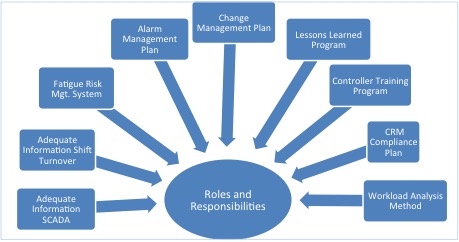| Last month’s article provided some guidance on building a control room team. Have you been using any of that guidance? The purpose of this article is to emphasize the importance of individuals and teams making progress and celebrating small wins together in the control room. Let’s link that purpose to some control room management elements. At this point in time, your control room should have procedures and practices in place for each of the elements in the illustration below. There should be progress in implementation and the members of your team should be meeting the requirements of your CRM Plan. There should be improvements in the quality of information provided to controllers, in fatigue mitigation, in alarm management, in managing changes, in learning lessons from incidents, in the training program and in managing the workload so it is neither too high nor too low. The work should be meaningful to all members of the team. Is it meaningful to you? At the end of a shift, is there a high level of satisfaction that you have done your best? Are you meeting the company’s and your own expectations?

Look at the picture on the first page. There appears to be a celebration and congratulations are being offered to a controller by other controllers. Would something like that occur in your control room if someone does something that deserves commendation? If not, why not do so? If so, is the positive feedback immediate and meaningful? Let me ask a different question. If a controller does something wrong and deserves criticism, is the negative feedback immediate and meaningful? All of us should know that feedback ought to be regular, balanced, and include a mixture of compliments and criticism. If your control room wants progress toward effective teamwork, develop ways to increase the celebrations of small wins. The celebration of one win can lead to other victories.
We have opportunities to work with many controllers in many control rooms. I am not satisfied that the work is meaningful to all controllers in all of the control rooms. And I grow weary of the criticism, complaints, and conflicts in some control rooms. There is a lack of camaraderie and common purpose, and that makes me wonder what could be done to increase job satisfaction and to reduce the griping about the job and the sniping at one another. Controllers have serious responsibilities and do not need to get distracted by dissatisfaction and discontent. Managers should develop strategies to increase attention to job requirements. All should share a commitment to pipeline safety and to professionalism in all aspects of the work. The responsibility is shared, and requires the best efforts of everyone.
I want to suggest a tool you could use as a starting point and encourage you to use it as a team. The Gallup Q-12 Survey was developed over a number of years to measure the most important elements of employee engagement. You can hire the Gallup organization to administer the survey and provide an organizational report. Or you can use the questions with your team and then develop a plan to improve the results. I adapted the questions to fit a control room team.
For example, a control room management plan should have clearly defined roles and responsibilities so all team members should know what is expected at work. Therefore, everyone should answer “Yes” to question one. Will everyone in your control room answer ‘Yes” to all twelve questions?
| Yes |
No |
Check either Yes or No |
|
|
- I know what is expected of me at work.
|
|
|
- I have the equipment, materials, and tools I need to do my work right.
|
|
|
- At work, I have the opportunity to do my best every shift.
|
|
|
- In the past seven days, I have received recognition or praise for good work.
|
|
|
- My supervisor, or someone at work, seems to care for me as a person.
|
|
|
- There is someone at work who encourages my development.
|
|
|
- At work, my opinions count.
|
|
|
- My job is important to the purpose or mission of the company.
|
|
|
- My coworkers are committed to safe operations and quality work.
|
|
|
- I have a best friend at work.
|
|
|
- In the past six months, someone has talked to me about my progress.
|
|
|
- In the past year, I have had opportunities to learn and develop my skills.
|
|
